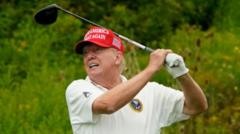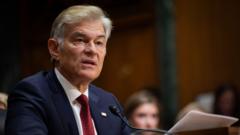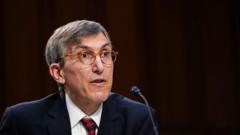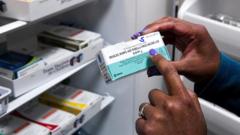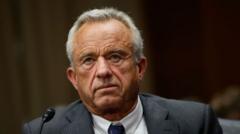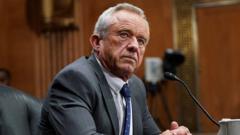Health Secretary RFK Jr. has announced a $500 million cancellation of mRNA vaccine funding, impacting multiple ongoing projects. His claims related to vaccine risks face criticism from health experts, who argue that mRNA technology has proven essential in combating pandemics.
RFK Jr. Halts $500M mRNA Vaccine Initiative Amid Controversy

RFK Jr. Halts $500M mRNA Vaccine Initiative Amid Controversy
The U.S. Department of Health and Human Services will cancel significant funding for mRNA vaccine projects, inciting debate on vaccine safety and efficacy.
The U.S. Department of Health and Human Services (HHS) recently revealed plans to cancel $500 million (£376 million) in funding aimed at the development of mRNA vaccines, designed to combat illnesses such as flu and Covid-19. This decision will affect 22 projects led by major pharmaceutical companies, including industry giants Pfizer and Moderna. Health Secretary Robert F. Kennedy Jr., who has expressed skepticism toward vaccines, defended the move by asserting that "mRNA technology poses more risks than benefits for these respiratory viruses."
The response to Kennedy's claims has been swift, with doctors and health experts voicing their concerns over his longstanding doubts regarding vaccine safety and efficacy. Peter Lurie, a former official with the U.S. Food and Drug Administration (FDA), emphasized that the advancement of mRNA vaccines was instrumental in controlling the Covid-19 pandemic and could potentially save millions of lives. He criticized the decision as the U.S. government turning its back on a crucial tool for future pandemic preparedness.
In a statement, Kennedy claimed that prior research supported the conclusion that these vaccines were ineffective in providing protection against upper respiratory infections such as Covid-19 and flu. He outlined a plan to redirect funding to "safer, broader vaccine platforms that maintain effectiveness despite viral mutations." Kennedy's assertions included the notion that mRNA vaccines might encourage viral mutations and prolong pandemics, although experts have countered that viruses mutate independently of vaccine presence.
Dr. Paul Offit, who heads the Vaccine Education Center at the Children's Hospital of Philadelphia, countered Kennedy's claims, commenting on how the flu virus undergoes yearly mutations regardless of vaccination efforts, while the measles virus remains stable despite the high vaccination rates achieved with mRNA shots. He reiterated that mRNA vaccines are "remarkably safe" and play a critical role in mitigating severe infections linked to viruses like Covid-19.
The HHS emphasized that the Biomedical Advanced Research and Development Authority (BARDA), the department overseeing vaccine projects, would prioritize "platforms with stronger safety records and transparent clinical and manufacturing data practices." This rationalization has led to further debate on the methodology and timing surrounding vaccine production and distribution.
While traditional vaccines operate using inactivated viruses to provoke immune responses, mRNA vaccines focus on instructing cells on how to produce proteins that elicit such responses. The safety and effectiveness of Pfizer and Moderna's mRNA vaccines were validated through rigorous trial phases involving thousands of participants prior to their distribution.
Experts fear that the cancellation of funds could render the U.S. disadvantaged in addressing future health crises. Dr. Offit highlighted that mRNA vaccines boast shorter development timelines, which were crucial in the rapid response to the Covid-19 outbreak. Since taking office, Kennedy has implemented significant changes within the nation's health department, including replacing an entire vaccine advisory committee with personnel who have voiced skepticism about vaccine safety and efficacy. He has also removed the Covid vaccine from the CDC's recommended immunization schedule for healthy children and pregnant women.










